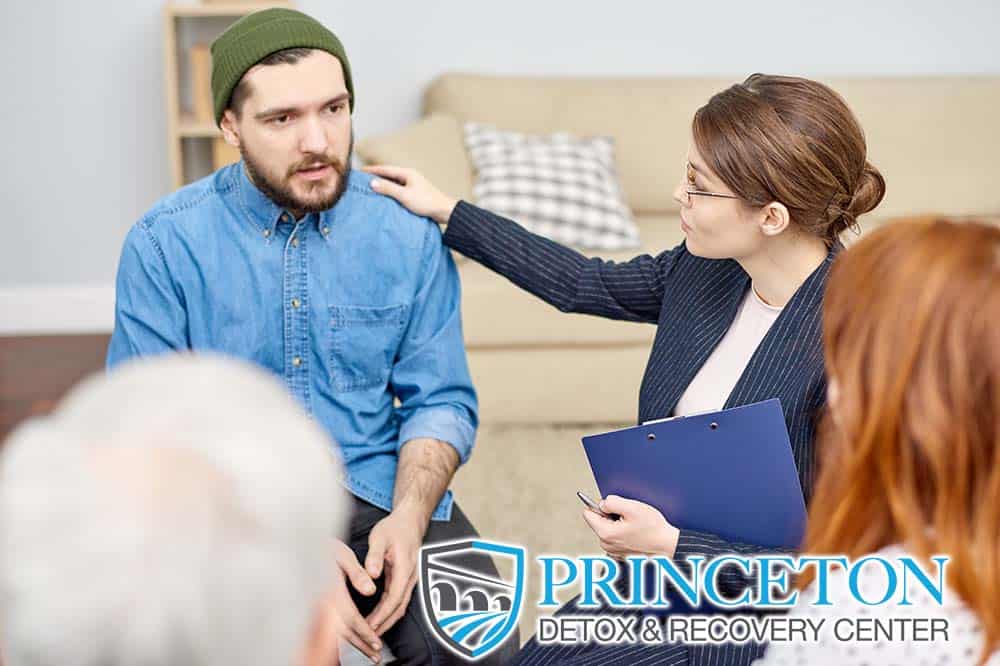Motivating a family member or friend to seek addiction treatment can be challenging and requires sensitivity and understanding. Although addressing this issue may not be easy, it is vital for their health and well-being. These conversations tend to be most effective when loved ones are educated and fully prepared to discuss their substance use and its impact on others. You should approach this discussion with openness, honesty, and compassion. Concerns should be expressed without judgment or accusations. If your loved one refuses treatment, keep in mind that this endeavor often takes time and multiple attempts. Consider consulting with a professional interventionist to organize and lead a family meeting focused on helping your loved one, which may be more likely to succeed.
Princeton Detox offers a wide variety of evidence-based treatments for substance misuse, including inpatient detox, individualized therapy, family therapy, medication-assisted treatment, and more. Addiction is a challenging disease, and recovery is a lifelong journey that requires loved ones to provide ongoing care, support, and understanding. Contact us today to learn more about our commitment to helping individuals overcome addiction and experience long-lasting sobriety and wellness.
Recognizing the Signs of Substance Misuse in a Loved One
Substance misuse is a serious and widespread problem that can lead to addiction, health problems, and even death.
Common Signs of Addiction To Look for Include:
- Bloodshot eyes.
- Changes in appetite, weight loss or gain.
- Disrupted sleep patterns.
- Poor hygiene and an unkempt appearance.
- Sudden mood and behavioral changes.
- Spending time with a new peer group.
- Secrecy and deception.
- Social withdrawal.
- Neglecting responsibilities.
- Losing interest in activities once enjoyed.
- Impulsivity and risk-taking.
- Irritability and anxiety.
- Depression.
- Anxiety and paranoia.
- Financial issues.
- Legal issues, such as arrest.
If your loved one is exhibiting these signs, it may be time to encourage them to seek professional treatment.
Talking to Your Loved One About Seeking Treatment
If you are planning on confronting your loved one, it’s important to choose a time when they are not under the influence of drugs or alcohol. It is also important to choose a private and comfortable environment where you can communicate effectively and without distractions. It’s crucial to approach your loved one in an empathetic and non-judgmental manner while also being forthcoming about your concerns and intentions. Remember to listen actively, be supportive, validate their feelings, and also emphasize the positive impact treatment can have on their health, relationships, and life.
We Are Here For You
Let Us Help You Heal
Our Drugs & Alcohol detoxification experience is second to none.
Learn how we can help by speaking with one of our Treatment Advisors today.
Exploring Treatment Options for Addiction
There are many options available for addiction treatment, including detox, inpatient and outpatient programs, therapy, support groups, and medication-assisted treatment. It is important to seek professional help to determine the best course of action for your loved one’s needs. You are encouraged to contact local addiction treatment centers directly to learn about their programs, services, and costs.
Tips for Finding the Right Addiction Treatment Program for Your Loved One Include:
- Consider Various Levels of Care—Depending on the severity of your loved one’s addiction. Inpatient treatment may be needed for more severe cases, while outpatient treatment may be appropriate for those with mild to moderate addictions.
- Look for an Evidence-Based Approach—Search for treatment programs that use evidence-based methodologies, such as cognitive-behavioral therapy (CBT), motivational interviewing, and medication-assisted treatment (MAT).
- Verify Accreditation and Licensing—Treatment programs should be licensed by the state, and accredited by reputable organizations, such as the Joint Commission. (1)
- Consider Staff Qualifications—It’s essential to ensure that staff members are experienced and qualified, including licensed therapists, counselors, and medical professionals.
Look Into Aftercare Services—Because recovery is a lifelong process, aftercare services are essential for maintaining sobriety, such as support groups and individual therapy.
Overcoming Barriers to Treatment: How To Get Them Started
Motivating your loved one to seek addiction treatment can be frustrating, and there may be barriers that make it challenging to convince them to take the first step. It is vital to approach the conversation with an understanding of potential obstacles while also providing them with information about the benefits of professional treatment and the repercussions of not seeking help.
- Denial—People with addiction are often in denial about the severity of their substance use or believe treatment isn’t necessary. Consider involving a professional interventionist to help organize and oversee the conversation.
- Stigma—Some may be reluctant to seek treatment due to the fear of embarrassment and judgment, which are common obstacles that need to be overcome. To get started, encourage them to attend support groups or see a therapist who specializes in addiction.
- Lack of Resources—Your loved one may not have insurance or access to affordable addiction treatment. Research community resources, such as free or sliding scale-based treatment programs, and look into helping them apply for government insurance programs such as Medicaid. (2)
Lack of Motivation—Your loved one may not be motivated to seek addiction treatment for a number of reasons, such as being overwhelmed by the process. You can help them by breaking the process into manageable steps, and providing encouragement and support when they succeed in achieving goals.
Supporting Your Loved One Through the Treatment Process
Supporting a loved one through the addiction treatment process is a vital part of their recovery journey.
Tips for Supporting Your Loved One Include:
- Seek Education—Learn as much as you can about addiction and the treatment process by attending education programs, researching using online resources or books, and consulting with healthcare professionals.
- Encourage Honest Communication—Encourage your loved one to express themselves openly about and share their thoughts and feelings with you throughout the treatment process.
- Attend Family Therapy or Support Groups—Participation in family therapy or support groups such as Al-Anon can allow you to share your own experiences and feelings related to your loved one’s substance use issues.
- Respect Boundaries—Respect your loved one’s boundaries and choices, even if they are not in line with your own. Pressuring someone into treatment may not be effective and result in further resistance down the road.
Celebrate Accomplishments—Your loved one’s milestones and achievements deserve celebration, no matter how small. It is important to acknowledge their successes, as it can boost their self-esteem and motivate them to continue with their efforts.
Addressing Co-Occurring Disorders During Addiction Treatment
Addressing co-occurring mental health disorders is an essential component of addiction treatment. Failure to address co-occurring disorders can lead to poor treatment outcomes and increased risk of relapse.
Strategies for Addressing Co-Occurring Disorders Include:
- Comprehensive Assessments—A thorough physical and psychiatric evaluation intended to help clinicians identify any co-occurring disorders.
- Integrated Programs—Treatment to address both the addiction and the mental health disorder simultaneously, including individual therapy, counseling, and other evidence-based methodologies. This includes cooperation between healthcare providers and mental health professionals, marked by consistent communication, joint treatment planning, and referrals to specialists as needed.
- Trauma-Informed Care—An essential aspect of comprehensive healthcare, as this approach focuses on the impact past trauma has on an individual’s physical and mental health and takes steps to create a safe and supportive environment conducive to healing. (3)
Ongoing Support—Participation in support groups, individual therapy, and other aftercare resources is vital for individuals with co-occurring disorders to maintain their recovery.
Dealing with Relapse: Keeping Your Loved One Motivated
It’s important to remember that relapse is a common part of the addiction recovery journey. It is crucial to have a plan in place for how to provide support and encouragement if your loved one relapses.
Tips for Motivating Your Loved One After a Relapse Include:
- Encourage them to reflect on the circumstances leading to the relapse and collaborate to identify triggers and improve coping strategies for the future.
- Remind them of the progress they’ve made in their recovery and stress the importance of continuing to work towards their goals.
- Offer emotional support and encouragement, and remind your loved one that you are there for them when they need you.
- Stress the importance of ongoing treatment, and encourage them to continue working with their healthcare providers to develop a personalized treatment plan that meets their needs and goals.
- Encourage them to engage in healthy habits like exercise, proper nutrition, and regular sleep patterns.
Contact Princeton Detox for Help
One of the keys to convincing a loved one to get treatment is to explore available options and, ideally, secure a place for them to go to begin the recovery process. Medical detox is typically the first critical step, as it helps individuals undergo withdrawal safely under constant medical supervision. It also provides them with support and medication that can help relieve uncomfortable and possibly severe symptoms, so they can concentrate on getting started on the early stages of recovery.
Contact Princeton Detox today for a free, no-obligation assessment and health insurance benefits check. You can speak to a skilled Treatment Advisor who can explain more about our simple admissions process and evidence-based programs and services. We are dedicated to helping families and their loved ones reconnect, heal, and foster healthier, more fulfilling relationships.

Reviewed for accuracy by:
Amanda Hilzer M.Ed, CAADC, IADAC, ICCS, LCADC, CCS
Amanda graduated from Lehigh University with both an undergraduate degree in Psychology and a Master’s of Education degree in Counseling Psychology and has worked in the field of substance use disorder treatment and mental health treatment as a counselor and as a clinical manager for over 14 years.


































